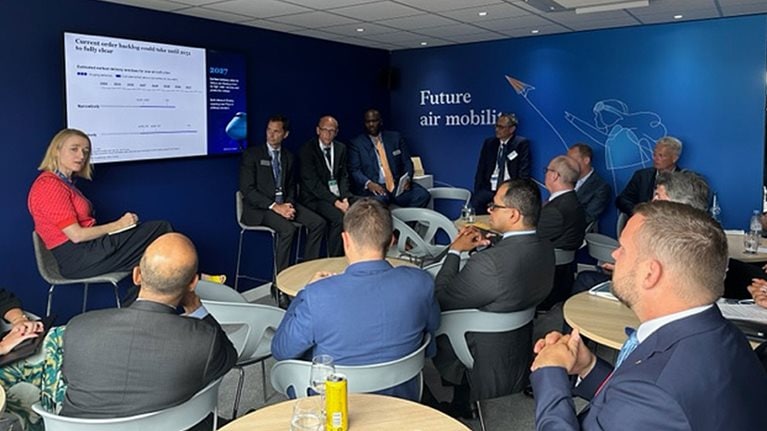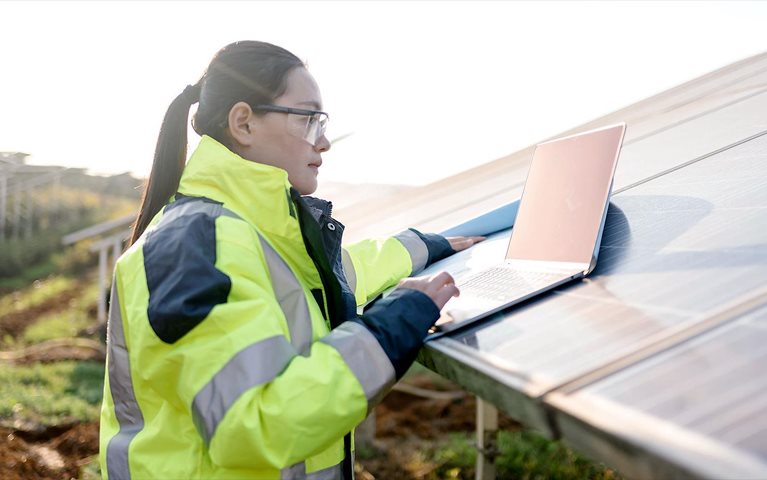The Paris Air Show reopened this year after a four-year hiatus following the COVID-19 pandemic. It welcomed more than 300,000 visitors eager for industry insights around the applications of AI, overcoming supply-chain difficulties, delivering on sustainable-aviation objectives, and what the future of air mobility could look like.
McKinsey hosted a range of aerospace innovation sessions at this year's event, covering topics such as the disruptive power of AI and advanced machine learning, and how to drive sustainability along every aspect of the value chain, from engineering to aftermarket services.
Expert panelists from aerospace and machine-learning companies such as Boeing, PhysicsX, and Cohere discussed how the latest developments in AI were proving to be fast-paced disruptors—but were also providing fresh opportunities to create value. Over the next ten years, they said, more than $50 billion could be at stake in sustainable aviation ventures.

“AI will be used to train pilots, provide better real time in-flight data and predict the booking patterns of customers so airlines can better manage resources,” said senior partner and coleader of McKinsey’s Aerospace & Defense Practice, Hugues Lavandier. “AI-assisted parametric design will also change the jobs of engineers. We will need to adapt to new skillsets.”
Sustainable and inclusive growth in the aerospace sector was a prevalent topic throughout the show, and McKinsey also hosted a lively panel discussion on how to economically implement sustainable aviation efforts. Leaders from Boeing, Airbus, Lufthansa, Heathrow Airport, and BP Aero took note of the fact that the aviation industry has committed to achieving net-zero flying by 2050. This commitment becomes even more relevant when considering that approximately 25 airlines—which represent more than 30 percent of global air passenger traffic—have already committed to the Science Based Target initiative to attain net-zero carbon emissions by 2050.
We need to keep up progress on developing sustainable aviation fuels and more efficient aircraft designs, while investing in novel propulsion systems.
“Aviation contributes between two and four percent of global CO2 emissions,” said Robin Riedel, partner and leader of the McKinsey Center for Future Mobility. “It’s a meaningful industry that we need to decarbonize. We need to keep up progress on developing sustainable aviation fuels and more efficient aircraft designs while also investing in novel propulsion systems using hydrogen or electric-battery systems. These might be longer-term solutions, but we are going to need them.”
Future air mobility could help contribute to aviation sustainability initiatives. Investment in the fledgling industry remains strong: in 2022, investors reached $3 billion in funding for FAM projects, and with approximately 6,700 orders, the overall investments represented $45 billion in value.
Many companies have advanced from early stage mock-ups to more tangible prototypes and manufacturing facilities. McKinsey hosted interviews with entrepreneurs leading the way, including Klaus Roewe, CEO of Lilium, an air mobility company; Adam Goldstein, founder and CEO of aircraft developer Archer Aviation; and André Stein, co-CEO of Eve Air Mobility, which specializes in electrical take-off and landing aircraft.
Although the future of the aerospace and aviation industry is brimming with innovation and technological advancement opportunities, there was one topic widely noted as a challenge: a looming talent gap. This is especially true in the software space, as our research has addressed.
“We had a significant loss of talent because of the decline in the aviation industry during COVID-19, particularly in manufacturing and engineering jobs,” said senior partner and coleader of McKinsey’s Aerospace & Defense Practice, Varun Marya. “We also have a lack of senior engineers in the pipeline, so we’re facing a talent deficit just as the industry is going through an upswing. We are feeling those shortages.”
There was, however, optimism that many of the challenges the sector is facing—especially developing sustainable aviation—are exciting, attractive options for people beginning their careers.
“When I speak to younger people who have joined the industry, they are very excited about trying to solve sustainability challenges,” noted Varun Marya. “It could be a distinct advantage in attracting talent.”
